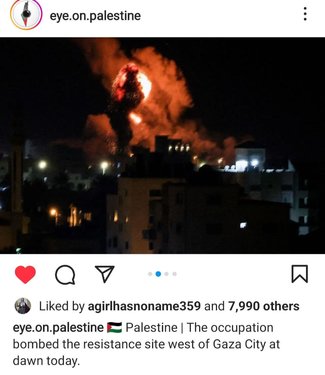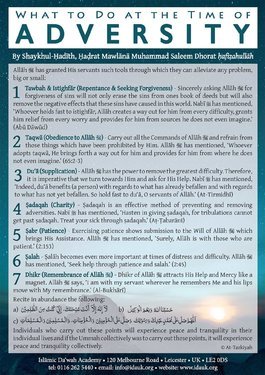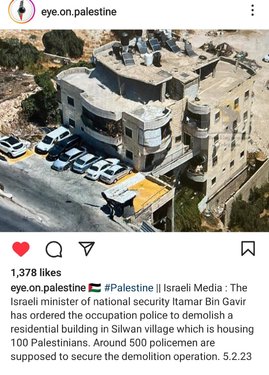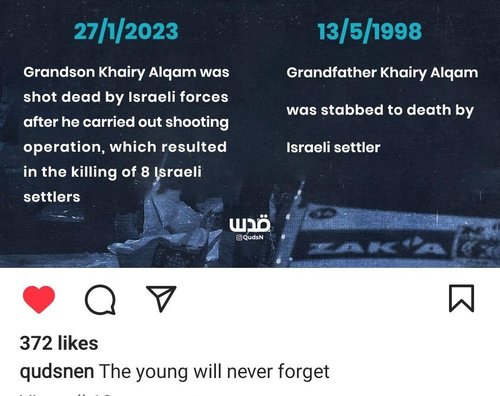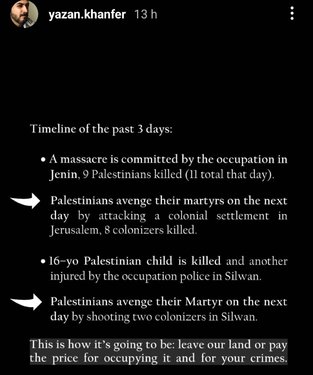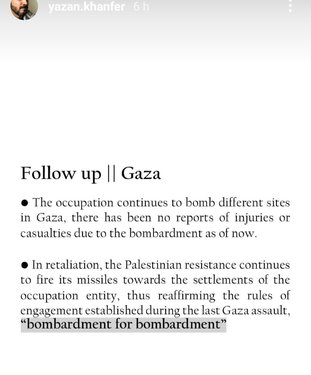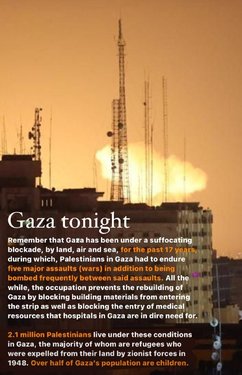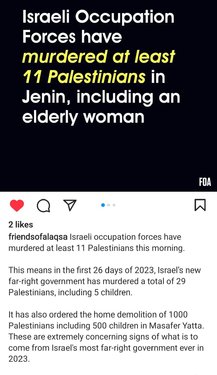-
Posts
8,434 -
Joined
-
Days Won
771
Content Type
Profiles
Forums
Events
Everything posted by ummtaalib
-
-
Several killed in Israeli raids on Syria’s Damascus: State media Syrian media say Israel fired missiles on Damascus’s Kafr Sousa neighbourhood, killing five and wounding 15. At least five people have been killed, 15 wounded and several residential buildings damaged in Israeli airstrikes on the Syrian capital Damascus, Syrian state media reported. The raids early on Sunday hit a building in central Damascus’s Kafr Sousa neighbourhood near a large, heavily guarded security complex close to Iranian installations, Reuters news agency said, citing witnesses. Loud explosions were heard over a central area of the capital around 12.30am (2130 GMT Saturday), and the Syrian Arab News Agency (SANA) reported that Syrian air defences were “confronting hostile targets in the sky around Damascus”. Citing a military source, SANA reported that five people had been killed, among them a soldier, along with “destruction of a number of residential buildings”. “It caused damage to several civilian homes and material damage to a number of neighbourhoods in Damascus and its vicinity,” the army said in a statement. Footage posted by state media showed that a 10-storey building was badly damaged in the attack, crushing the structure of its lower floors. “The strike on Sunday is the deadliest Israeli attack in the Syrian capital,” said Rami Abdel Rahman, head of the Syrian Observatory for Human Rights, a United Kingdom-based group that has a wide network of sources inside Syria. Israel has not commented on the airstrikes which come more than a month after an Israeli missile attack hit the Damascus International Airport, killing four people, including two soldiers. Full report: Al-Jazeera
-

What to do at the time of Natural Catastrophes
ummtaalib replied to ummtaalib's topic in General Islamic Articles
Our Responsibility during Calamities By Shaykhul-Hadīth, Hadrat Mawlānā Muhammad Saleem Dhorat dāmat barakātuhum When a person is afflicted with a calamity, catastrophe, grief etc., the people around him/her; the family, friends and the wider Muslim community, all have a role to play. We often remain neglectful and fail to fulfil our duties in this regard. I would like to mention a few points concerning this which will be of benefit inshā’allāh. 1. Feel for others The Sharī‘ah has advised us that we should realise and feel the pain the afflicted Muslim is going through. It is unfortunate that we have become very hard-hearted and do not feel the pain of others. Rasūlullāh sallallāhu ‘alayhi wa sallam has given much emphasis to brotherhood and having feeling for one-another, rather feeling for every living creature. Take a look at the beautiful teachings of Islām: Allāh ta‘ālā states in a verse mentioning the qualities of the Sahābah radhiyallāhu ‘anhum: In another verse, Allāh ta‘ālā instructs us regarding non-Muslims: Rasūlullāh sallallāhu ‘alayhi wa sallam has stated: 2. Give Support Together with realising the difficulties and pain the ones afflicted are undergoing, the Sharī‘ah has instructed us to give support and condolence. Rather than becoming bystanders, we should act positively. It is for this reason the instruction of ta‘ziyah (consoling) has been given. In one hadīth Rasūlullāh sallallāhu ‘alayhi wa sallam has stated: So, Rasūlullāh sallallāhu ‘alayhi wa sallam has encouraged us to console the one afflicted and the whole purpose of consoling is to give support and lessen the grief from the one afflicted. It is strange to note our adverse conduct in this regard that we, instead of offering supporting words, increase the grief and sorrow by our statements. We, in order to show we are very much grieved, say and do those things which act as salt on the wound. Lāhawla walā quwwata illā billāh! When consoling, we should give a positive outlook to the difficulty. A positive aspect to the matter works wonders in reducing the grief of the afflicted. If someone’s father has passed away, one can give a negative aspect to the issue and say, ‘What a great loss! Truly you have now lost a great person. How will you cope without him?’ etc. and one can also speak positively and say, ‘You were very fortunate that the cool shadow of your father remained over you for 40 years. There are so many people whose fathers have passed away in their childhood…’ It is narrated that after the demise of ‘Abbās radhiyallāhu ‘anhu, his son, Ibn ‘Abbās radhiyallāhu ‘anhu remarked, “No one consoled me better than the Bedouin.” The story is that a Bedouin came to console Ibn ‘Abbās radhiyallāhu ‘anhu and said the following couplets: اصبر نکن بك صابرین فإنما صبر الرعیة بعد صبر الرأس وخیر من العباس أجرك بعدہ والله خیر منك للعباس 3. Make du‘ā Making a du‘ā is one of the best ways to assist the one afflicted. Rasūlullāh sallallāhu ‘alayhi wa sallam has stated that from amongst the du‘ā that is most quickly accepted is the du‘ā of the absent person for another. (Abū Dāwūd) Du‘ā is the most powerful weapon a believer has. Rasūlullāh sallallāhu ‘alayhi wa sallam has stated, “Du ‘ā is a weapon of the believer…” (Al-Ḥākim) Our du‘ā should not be restricted to the affected. If such a calamity has occurred wherein there is some mischief from a person, then also make du‘ā of divine guidance for that person too. Our attitude should be to pray for the enemies instead of cursing and making inappropriate statements. To understand this, we only need to look into the sīrah of Rasūlullāh sallallāhu ‘alayhi wa sallam. Whilst returning from Tā’if, after having been persecuted by its people, Rasūlullāh sallallāhu ‘alayhi wa sallam made du‘ā for them instead of cursing them. 4. Take lesson and prepare Seeing another in a pitiful condition is an opportunity to learn a lesson. It was the Grace of Allāh ta‘ālā that we are not in their shoes, but Allāh ta‘ālā is All-Powerful. He can bring such adverse conditions upon us too; therefore, we should use such incidents to bring a positive change in our lives. One should reflect in the following ways: a. Look at the one afflicted and start to prepare for such times. We should always ask Allāh ta‘ālā for ‘āfiyah, however, as we have discussed previously, difficulties and hardships in this world are inevitable, hence we should mentally prepare ourselves so that we react correctly in such circumstances. We should embed in our minds that should I be afflicted, I will exercise patience and think positively, so that I may reap the rewards promised for patience. b. In preparation for such times, one needs to begin to rectify his life and make it one of taqwā, as this is the only tool which will allow a person through difficult circumstances. Allāh ta‘ālā states, “…Whoever creates the veil of taqwā between himself and the disobedience of Allāh ta‘ālā, Allāh ta‘ālā will bring forth a way out for him.” (65:2) c. When such catastrophes occur to close ones or to someone in our locality, the feeling of loss can be more easily perceived and lessons can be learnt. In a recent incident, in our locality, a whole family was lost out by a fire and only one member remained. It is not difficult to understand the extent of this loss and how the remaining individual must be feeling. Having realised the severity of this loss, one should reflect on the hadīth of Rasūlullāh sallallāhu ‘alayhi wa sallam that whoever misses the ‘Asr salāh, it is as if he has lost his whole family and wealth. (Muslim) This way it will become easy for us to realise the loss we are making daily and this realisation will encourage us to repent sincerely and submit to the Commands of Allāh ta‘ālā. 5. Think about the future When calamities strike they tend to be sudden. Those who are afflicted with a calamity and leave this world do not have the opportunity to decide in what state they wish to leave. If they leave in a good state, with Īmān and taqwā; they are fortunate. The same can be our state; death may come unannounced. We need to contemplate and ponder whether we are ready to face death if it was to strike suddenly without notice. Rasūlullāh sallallāhu ‘alayhi wa sallam has said, “Each person will be resurrected in the state he/she has died.” (Muslim) Therefore, we should immediately begin preparing for the inevitable and remain ready at all times. May Allāh ta‘ālā grant us all the tawfīq. Āmīn. © Riyādul Jannah (Vol. 22 No. 11, Nov 2013) -
Following is a reply to a question on an Ifta group (Mufti Muajul I. Chowdhury) on being asked about certain famous speakers with big following on social media. In the Name of Allaah, the Most Gracious, the Most Merciful. As-salaamu ‘alaykum wa-rahmatullaahi wa-barakaatuh. Imaam Muhammed ibn Sireen (Rahimahullaah) has advised[1]: إِنَّ هَذَا الْعِلْمَ دِينٌ، فَانْظُرُوا عَمَّنْ تَأْخُذُونَ دِينَكُمْ “Verily, this knowledge is Deen, so be cautious of whom you take your religion from.” (Muslim) The following guidelines will assist in determining an upright ‘Aalim (scholar) of Deen: He is from the Ahlus Sunnah Wal Jamaa’ah[2] in matters of ‘aqeedah and fiqh. He is a graduate of a celebrated and accepted Islaamic traditional institute. He does not violate the laws of Shari’ah[3], for example: the laws of hijaab and intermingling. His teachings and statements are in accordance to the Shari’ah. He does not engage in bid’ah[4]. He is recognized and approved by the righteous learned scholars. If any of the above guidelines are violated, then one should not follow such a person. You may conduct your own investigation regarding the above individuals and use the above guidelines to decide. You should also enquire from the local ‘Ulamaa about them based on the above guidelines. If any person falls short of any one of the above conditions, then one should respectfully avoid seeking guidance from such a person. And Allaah Ta’aala Knows Best. Muajul I. Chowdhury Read more at askimam.org/public/question_detail/41666
-
-
Our heartfelt du'a for the people of Turkey and Syria and all people suffereing in the world. Allah Almighty have mercy on the Ummah!
-
Turkey Earthquakes: Today, the 6 Feb 2023, is indeed a very sad day for the Muslim Ummah considering the devastating earthquakes that took place in Turkey early this morning. Turkey is very close to the heart of the Muslim Ummah as it was the capital of the Islamic Caliphate for many centuries. We know the great work that Turkey has done for the Muslim Ummah and especially the Haramain Shareefain. The epicentre of this earthquake was the city of Gaziantep. This city is very close to the Jamiat Ulama KZN, South Africa, as we have been working in this area since 2013 and presently as well in our Syrian Relief Projects. Such good and noble work has taken place from this city giving relief to the Syrian refugees living therein, and at the border of Turkey and Syria and within Syria itself. Our hearts go out to the people of Gaziantep and to all our colleagues in Turkey particularly in this area. Everything is in the control of Allah Ta’ala. There are many lessons for us to take from what we have seen that these conditions can come about at any time, and we have absolutely no control over them whatsoever. May Allah Ta’ala remove their difficulty, ease the condition for those who have suffered injuries and grant them Shifa Kamila. May He grant forgiveness and high stages in Jannah to those who have passed away and may He make it easy for them to rebuild what has been destroyed, Ameen Yaa Rabbal Aalameen. Ahmed Mahomedy For Jamiatul Ulama KZN International Syrian Relief Team
-
Ask Allah to Bless Your Day أَصْبَحْنَا وَأَصْبَحَ الْمُلْكُ لِلّٰهِ رَبِّ الْعَالَمِيْنَ ، اَللّٰهُمَّ إِنِّيْ أَسْأَلُكَ خَيْرَ هٰذَا الْيَوْمِ ، فَتْحَهُ وَنَصْرَهُ وَنُوْرَهُ وَبَرَكَتَهُ وَهُدَاهُ ، وَأَعُوْذُ بِكَ مِنْ شَرِّ مَا فِيْهِ وَشَرِّ مَا بَعْدَهُ We have entered the morning and at this very time the whole kingdom belongs to Allah, Lord of the Worlds. O Allah, I ask You for the goodness of this day: its victory, its help, its light, and its blessings and guidance. I seek Your protection from the evil that is in it and from the evil that follows it. Aṣbaḥnā wa aṣbaḥa-l-mulku li-llāhi Rabbi-l-ʿālamīn, Allāhumma innī as’aluka khayra hādha-l-yawm, fatḥahū wa naṣrahū wa nūrahū wa barakatahū wa hudāh, wa aʿūdhu bika min sharri mā fīhi wa sharri mā baʿdah. Abū Mālik al-Ashʿarī (raḍiy Allāhu ʿanhu) narrates that the Messenger of Allah ﷺ said: “When one of you enters the morning, they should say [the above]; and when they reach the evening, they should say the same.” (Abū Dāwūd 5084) Brief Commentary • “We have entered the morning” means we have entered another morning, covered in Your protection, O Allah; enveloped in Your blessings, occupied with Your remembrance, seeking help with Your Name, and only breathing and living through Your will and power. • We begin the duʿā’ by affirming that the kingdom belongs to Allah, therefore He is the true King who has ownership over everything. The knowledge of this increases the awe and veneration we have for Allah. • After affirming the kingdom belonging to Allah, we mention what He does with His Kingdom: He looks after it. We describe Allah as being “Lord of the worlds” i.e. all that exists. When we say Allah is the Lord, we mean He is the one who looks after, nurtures and provides, therefore we should be grateful for Allah as He is the Lord of all that exists. • Once we realise that Allah is the one who provides for us and looks after us in the general sense, we begin to ask Him for specific things that we want from this morning or evening. • The first thing we ask Allah, is that we ask Him for the “goodness of this day/night.” We do not specify what good we want; therefore, we are asking Allah for all the good that there is. This includes the good with regards to this life (e.g. good health, security, peace of mind); and more importantly, the good with regards to the hereafter (e.g. praying the night prayer, reciting the Qur’an). • We ask Allah for “victory” and “help”. The victory here is both a physical and spiritual one, so we are asking Him for His help to allow us to be victorious against our enemies, shayṭān, as well as against our own nafs (inner self). • The “light” of the day refers to the light of guidance and īmān, which is present in the heart of the believer. It also refers to beneficial knowledge and righteous actions. • When Allah places His blessings on a matter, it will bear much more fruit than a matter which is not blessed. Therefore, when we ask Allah for the “blessings” of this day, we are asking Him to bless everything we have and do on this day, such as: our time, food, sleep and wealth. We are asking Allah to facilitate a pure and lawful income. More importantly, we are asking Him to bless our acts of worship, and cause them to be a means of further good in all aspects of our lives and the hereafter. • The last specific thing we ask Allah in this duʿā’, is to grant us the goodness of this day in terms of the “guidance” we receive. We are asking Allah to increase us in guidance, and to grant us steadfastness on it. • We finish off the duʿā’ by seeking refuge in Allah from all the evil that exists on this day, as well as all the evil that exists after it. This includes evil in terms of matters that may affect us in the world (e.g. harm, injury) as well as those that affect us in the hereafter (e.g. sins and transgressions against Allah). Action Points • True kingdom belongs to Allah alone. All the leaders and kings in this life all fall within the kingdom and dominion of Allah. This should remove the fear of worldly kings, authorities and leaders from our hearts; and make us realise that we have the King of kings by our sides. • We are asking for ‘opening’ in knowledge, guidance, sustenance, and all good. It also includes the ‘opening’ (i.e. removal) of grief, sorrow and all complicated matters. • When asking Allah for victory, do not just think about victory against the visible enemies. Focus also on your hidden enemies that could cause a greater destruction to your hereafter, such as Shayṭān, and your own nafs. • Always ask Allah to bless all your matters. Someone may sleep for 4 hours and feel very refreshed and energetic for the remainder of the day, whereas someone may sleep for over 8 hours, yet does not have much energy during the day. This is due to the blessings Allah had placed on the former, and the lack of it in the latter. • A means of securing blessings is to wake up early in the morning, as the Prophet ﷺ prayed for the mornings of his ummah to be blessed. • Making this duʿā’ in the morning is an indication that the true believer does not sleep or be heedless of his Creator at this precious time, as the morning is when the sustenance is distributed. Asking for ‘guidance’ is one of the most important duʿās we can make, hence why we seek guidance at least 17 times a day in Sūrah al-Fātiḥah. We should never underestimate the danger of slipping off the path of guidance (the straight path), and should always ask Allah to grant us steadfastness. lifewithallah
-
By Shaykhul-Hadīth, Hadrat Mawlānā Muhammad Saleem Dhorat dāmat barakātuhum Who is the Clever One? Rasūlullāh sallallāhu ‘alayhi wa sallam said: A Sahābī once asked Rasūlullāh sallallāhu ‘alayhi wa sallam, ‘Who is the cleverest and most far-sighted of the people, O Rasūlullāh?’ Rasūlullāh sallallāhu ‘alayhi wa sallam replied: Temporary World Such people are the clever ones because they prepare for the life which is eternal and everlasting. To help us better comprehend this, Imām Ghazālī rahimahullāh presents a striking example. He says, ‘If the whole world was filled with corn or chickpea seeds, and a bird was to take one seed after a million years, then another seed after another million years, and it continued to take one seed after every million years in this manner, then a time will come when the seeds will all finish, but the Hereafter will not end; it is everlasting.’ Allāh ta‘ālā is Al-Bāqī (The Eternal); He will never perish. Since Allāh ta‘ālā is Eternal, anything we carry out for His Pleasure also becomes eternal, i.e. its reward will be everlasting. Anything associated to us and this world will perish; and anything associated to Allāh ta‘ālā or the Ākhirah will remain forever. Allāh ta‘ālā states: The paltry benefits of this world are nothing in comparison to the life Hereafter, both in quality and quantity. Allāh ta‘ālā states: Pleasures of the Dunyā We should not let the superficial pleasures and enjoyment of this world deceive us and deprive us from the everlasting pleasures of the Hereafter. Every unlawful enjoyment brings with it pain and grief in this world and more in the Hereafter. Due to weakness in our Īmān, we sometimes become envious of the lavish lives of those who freely disobey Allāh ta‘ālā, and stare with desirous eyes at what they have. What we fail to realise is that we only see them when they are in the public sector, where every person feels the need to project a much decorated and glamourous image of himself. What is hidden behind their smile is known only to them and Allāh ta‘ālā. We do not see what they are going through behind closed doors, during the night or when alone. Similarly, we do not know what is to happen to them in the near future or when they reach old age. Peace and tranquility are taken away from such people and they face much hardship in this very world, and in the Hereafter the fire of Jahannam awaits them. Allāh ta‘ālā states in the Glorious Qur’ān: Despite having all the recourses of pleasure, they are restless and find no peace at heart because true peace and contentment are directly from Allāh ta‘ālā and come only through His remembrance and obedience to Him. Allāh ta‘ālā states in the Glorious Qur’ān: Those who obey Allāh ta‘ālā are granted peace and traquility in this world before the everlasting success of the Hereafter. Allāh ta‘ālā states: Thus, those who choose the dunyā and make it their sole objective suffer in this world and the next, whilst those who give preference to the Ākhirah by obeying Allāh ta‘ālā and restraining their nafs from unlawful pleasures receive the best of both worlds. They enjoy true peace in this world, and the everlasting and unimaginable pleasures of the Hereafter. Allāh ta‘ālā says in a Hadīth Qudsī: Two Choices We now have two choices. The first choice is that we freely follow our unlawful desires and 'enjoy' the so-called pleasures of this world at the cost of our Hereafter. The second choice is that we sacrifice the paltry unlawful pleasures of this world in order to secure the everlasting bliss of the Hereafter. Which choice will a person of average intellect opt for? Muftī Muhammad Shafī‘ ‘Uthmānī rahimahullāh who was an ‘Ālim of a very high repute, the author of the well-known tafsīr, Ma‘āriful-Qur’ān, gives a beautiful example to help us understand this choice better. He says, ‘A person is given the choice between two houses; a luxurious palace with all comforts and facilities and a small home with lack of facilities. Then he is told that the palace will remain in his possession for a duration of ten years after which one will have to vacate, whilst the small home is for him to keep permanently. Which of the two will an intellectual person opt for? Surely an intellectual person will understand that choosing the palace will leave him homeless after ten years, whilst the small home despite being far less comfortable will become a permanent residence for him, his wife and his children. Thus, he will give preference to the smaller home.’ It is worth noting that in this example the temporary abode is far better in quality and comfort than the permanent abode, yet a person will still choose the latter. If a person prefers the small home despite having far less facilities and comforts for the sole reason that it is a permanent abode, then why would the faculty of intellect not guide a person to give preference to the Ākhirah which is permanent and far better too? Will Life become Dry? Giving preference to the Ākhirah is not to say that our lives will become dry and that we will enjoy no pleasure in the worldly life at all. No. One will continue to enjoy his life by benefitting from the scores of lawful pleasures Allāh ta‘ālā has created. What Allāh ta‘ālā has made permissible is far more in number than what Allāh ta‘ālā has made impermissible. From the items available to eat, the halāl far outweigh the harām. From the things we can wear, see, hear and touch, the halāl are far more than the harām. Thus, a pious Muslim is not deprived of pleasure. We are only asked to refrain from the utterly greedy act of indulging in harām even after Allāh ta‘ālā has granted us so many halāl ways to enjoy. May Allāh ta‘ālā grant us the tawfīq to make the right choice and give preference to the Ākhirah over this dunyā, and as a result, enjoy a tranquil worldly life and acquire the eternal success and pleasure of the Ākhirah. Āmīn. © Riyādul Jannah (Vol. 31 No. 1, Jan 2022)
-
Gunman kills 7 people in occupied East Jerusalem attack Shooting follows a deadly Israeli raid in the occupied West Bank’s Jenin refugee camp that killed nine Palestinians. A gunman has killed seven people near a synagogue in an Israeli settlement in occupied East Jerusalem before being fatally shot, in an escalation of violence following a deadly Israeli military raid in the West Bank a day earlier. Al-Jazeera
-
أَصْبَحْنَا وَأَصْبَحَ الْمُلْكُ لِلّٰهِ وَالْحَمْدُ لِلّٰهِ ، لَا إِلٰهَ إِلَّا اللّٰهُ وَحْدَهُ لَا شَرِيْكَ لَهُ ، لَهُ الْمُلْكُ وَلَهُ الْحَمْدُ ، وَهُوَ عَلَىٰ كُلِّ شَيْءٍ قَدِيْرٌ ، رَبِّ أَسْأَلُكَ خَيْرَ مَا فِيْ هٰذَا الْيَوْمِ وَخَيْرَ مَا بَعْدَهُ ، وَأَعُوْذُ بِكَ مِنْ شَرِّ مَا فِيْ هٰذَا الْيَوْمِ وَشَرِّ مَا بَعْدَهُ ، رَبِّ أَعُوْذُ بِكَ مِنَ الْكَسَلِ وَسُوْءِ الْكِبَرِ ، رَبِّ أَعُوْذُ بِكَ مِنْ عَذَابٍ فِي النَّارِ وَعَذَابٍ فِي الْقَبْرِ We have entered the morning and at this very time the whole kingdom belongs to Allah. All praise is due to Allah. There is no god worthy of worship except Allah, the One; He has no partner with Him. The entire kingdom belongs solely to Him, to Him is all praise due, and He is All-Powerful over everything. My Lord, I ask You for the good that is in this day and the good that follows it, and I seek Your protection from the evil that is in this day and from the evil that follows it. My Lord, I seek Your protection from laziness and the misery of old age. My Lord, I seek Your protection from the torment of the Hell-fire and the punishment of the grave. Aṣbaḥnā wa aṣbaḥa-l-mulku li-llāh, wa-l-ḥamdu li-llāh, lā ilāha illa-llāhu waḥdahū lā sharīka lah, lahu-l-mulku wa lahu-l-ḥamd, wa huwa ʿalā kulli shay’in Qadīr, Rabbi as’aluka khayra mā fī hādha-l-yawmi wa khayra mā baʿdah, wa aʿūdhu bika min sharri mā fī hādha-l-yawmi wa sharri mā baʿdah. Rabbi aʿūdhu bika mina-l-kasali wa sū’i-l-kibar, Rabbi aʿūdhu bika min ʿadhābin fi-n-nāri wa ʿadhābin fi-l-qabr. ʿAbdullāh b. Masʿūd (raḍiy Allāhu ʿanhu) narrates that when the Messenger of Allah ﷺ used to enter the morning, he would say [the above]. (Muslim 2723) lifewith allah
-

.thumb.jpg.3f91379b6a55b7ebad15c0d9a7e6d206.jpg)
.thumb.jpg.62aeacd0372d3dcfa8013990aa4d895b.jpg)
.thumb.jpg.22c4b22daea0188b88c4930eb2b34836.jpg)
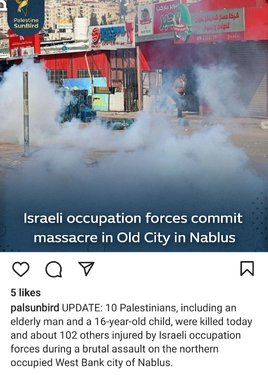
.thumb.jpg.9197d4950f831b86bab3c50e4681d068.jpg)
.thumb.jpg.20dce5f89d2ec7bfa66f363ef45a2d6d.jpg)
.thumb.jpg.b286bac85bf0e26e0858db876c11893d.jpg)
.thumb.jpg.2af475d32afceda24959361e0f870fdd.jpg)

